Confectionery
Compiled by Martin Willey
UK and Europe, artwork packet, with cards to collect inside each packet.
Monty Gum was based in Leiden, the Netherlands (and named after the British world war 2 general Montgomery). They was sold primarily in the Netherlands, Belgium, Germany and France, and, from the mid-1970s, the UK. Earlier they used deals with UK distributors. Their main lines were football cards, but by the 1960s they were also doing TV, film, cartoons and pop music card series. In 1966 they produced a "TV Hits" range with The Saint, Thunderbirds, Mission Impossible and others. They also printed, for the UK company Somportex Ltd, sets of Thunderbirds cards (in both English and Dutch versions). Other UK-related sets included The Persuaders, and a UFO set (reprinting the cards from the UK's Anglo Confectionery Ltd). In the mid-1970s, other popular sets included Kojak and The Six Million Dollar Man.
The Space: 1999 cards are 7 x 5 cm, with colour photos on one side (Yr 1, almost all reversed). The full set is 64 cards, and was issued in two different editions.
The first set was titled "Space/Cosmo: 1999" and issued in France in 1976 (Cosmos 1999 was being shown on TF1). The show was eventually shown in the Netherlands in 1978 on VARA, so they reissued the cards as "Space/Alpha: 1999"; this set had limited distribution in Belgium (which was then finishing year 2 on BRT 1) and the UK (in repeats). Monty Gum was launching a number of different sets in the UK around the time, but with limited broadcasts, UK distribution of the card sets was poor.
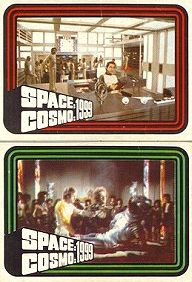 |
"Space/Cosmo: 1999" | 1976, France | Unnumbered, backs building into b/w photo of Ring Around The Moon astronauts. |
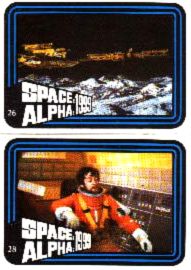 |
"Space/Alpha: 1999" | 1978, Netherlands, Belgium, UK | Numbered, no picture on back. |
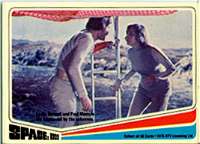
US 1976, 10c a packet
Eighth of an ounce of bubble gum, with cards to collect inside each packet.
Donruss was founded in Tennessee, USA in 1954 (named from the first names of the founders, Douglas, Don and Russ). It was bought by General Mills in 1969. They specialised in non-sports entertainment cards such as The Addams Family, until the 1980s when it began baseball cards. Since 2009, it has been part of Panini.
Cards: 9 x 6.5 cm, with colour photo (Yr 1), numbered with pithy caption. Back of cards builds into a large photo of an Eagle launching from a pad under a yellow logo. Set composed of 66 cards. Uncut sheets (ideal for showing the Eagle image on the reverse) were also available.
A lot containing loose cards (presumably a full set) and two unopened boxes from Martin Landau's estate was sold in September 2019 for $475.
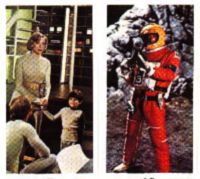
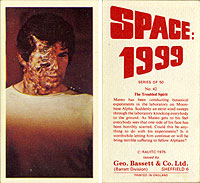
UK 1975, 3p a packet, later 4p.
George Barratt established his confectionery business in 1848, and by 1906 it was the biggest confectionery company in the world. In the 1920s it began to produce sweet cigarettes (sugar candy sticks) with cards in each pack, primarily footballers. In 1966, the company was taken over by Bassett; George Bassett had started his confectionery business in 1842, and became best known for Liquorice Allsorts (invented in 1899), and Jelly Babies (1918). In 1989, Bassett was taken over by Cadbury; the Barratt brand was sold in 2008. In 1975, the logo was Barratt, with the credit "Geo. Bassett and Co. Ltd (Barratt division)".
Sweet cigarettes were sticks of sugar candy with a red tip, made to look like cigarettes but aimed at children. Launched in the 1920s by Barratt, they were still popular but controversial in the 1970s, and have almost disappeared since the 1980s. The collectable cards imitated the cards that real cigarette companies used to promote their packs from the late 1880s. Barratt had previously produced cards for Thunderbids and UFO.
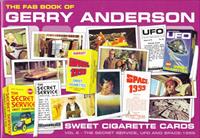
The fan club Fanderson published a book, FAB Book of Gerry Anderson Sweet Cigarette Cards, Vol 2 in June 2014, which covers the Barratt cards with high resolution scans and descriptions (as well as the Barratt cards for the Gerry Anderson series The Secret Service and UFO).
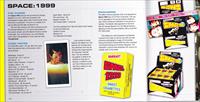
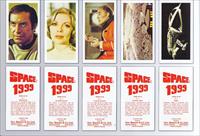
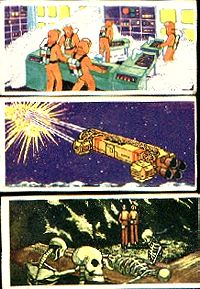
UK 1976 7p
Lyons started as a chain of UK teashops in 1884 before expanding into cakes and pastries, and from 1925 ice cream under the Lyons Maid brand. In 1963 they introduced the "Zoom" ice lolly, which was promoted with television adverts, in a tie-in with Gerry Anderson's Fireball XL5. Other innovations were adding picture cards in each lolly, and a mail-in offer for a plastic kit (made by Airfix for Lyons Maid). In 1965 the "Sea Jet" ice lolly was a tie-in with Anderson's Stingray, while in 1967 they linked "Zoom" to Thunderbirds and launched a new ice lolly called "Fab" with a Thunderbirds tie-in, explicitly targeted at girls. In 1968 the new "Orbit" ice lolly was tied to Captain Scarlet. All these lolly brands continued under their original names, losing the TV series connections after a few years. In 1976 Space: 1999 and "Bionic Lolly" (The Six Million Dollar Man) were unusually named explicitly for the TV series. They also made a Star Wars in 1978 and a Star Trek in 1980.
Space: 1999 was vanilla-flavoured ice cream base, with a lime shell and strawberry jelly filled centre. Each lolly was 1.7 fl oz (48ml).
This product was launched with an animated television commercial, illustrated by Frank Bellamy and shown from summer 1976.
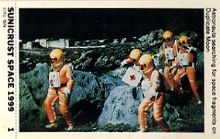
Australia 1975
In the 1970s, Sunicrust bread issued collecting cards in their bread, mostly using cricket and football subjects, but also producing two Disney sets (1973 and 1974) and a 1974 cartoon Mad Moon Monsters set. Space 1999 seems to be the only licensed set, after Disney. There was one card per loaf (860g Sunny Wholemeal, 680g Sunny Toast and 680g Sunny White Sliced), each baked into the bread with no protective wrapper.
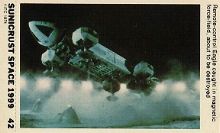
Italy 1979?. Price 150 lira per bag (150g?).
In UK English crisps, in US English potato chips. The packet art is identical to the Panini year 2 album, and it is possible that packs contained a number of Panini stickers. Thanks to Andrea Gualco.
Further Reading:
Copyright Martin Willey